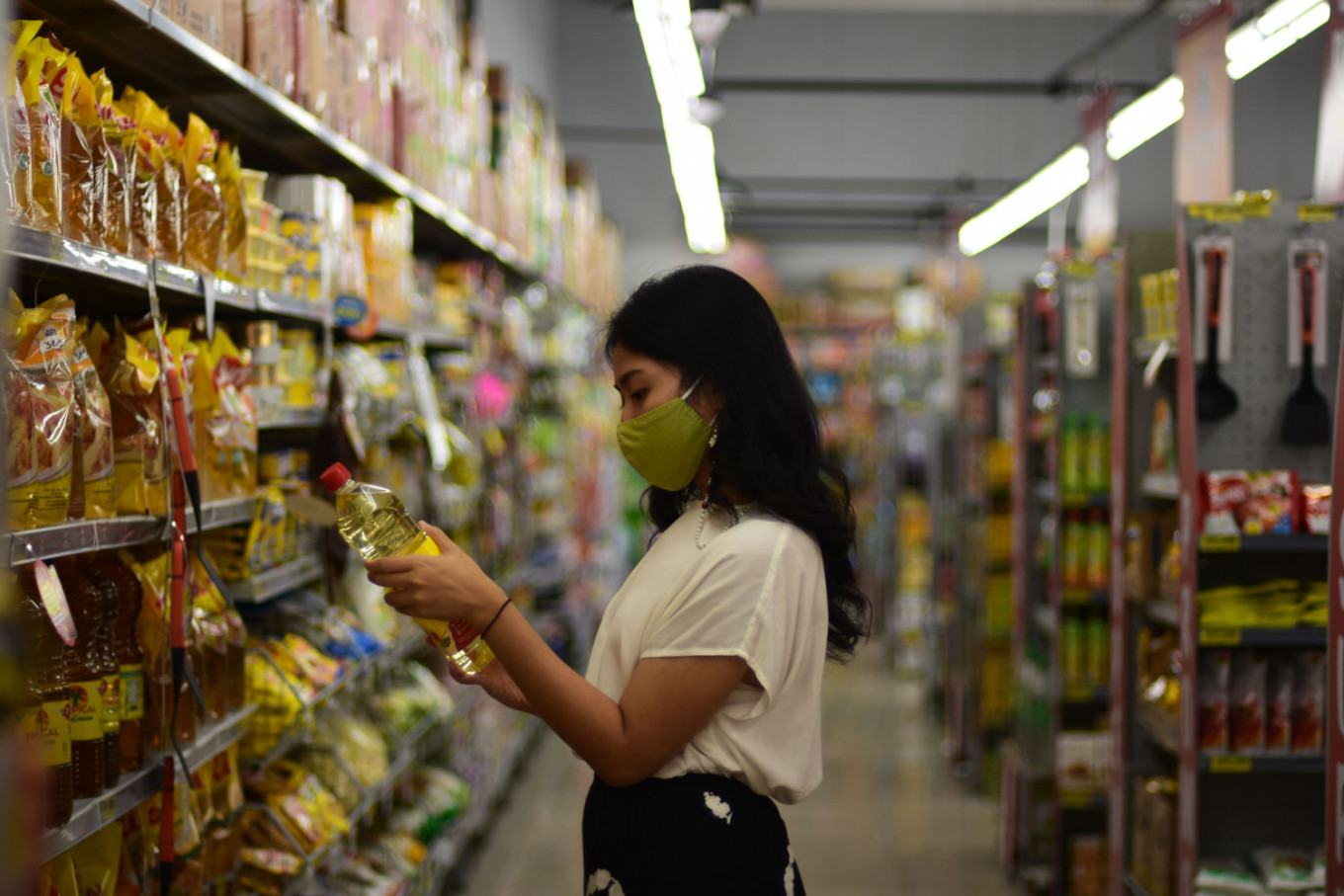Popular Reads
Top Results
Can't find what you're looking for?
View all search resultsPopular Reads
Top Results
Can't find what you're looking for?
View all search resultsWhy should you care about sustainable palm oil?
Change text size
Gift Premium Articles
to Anyone
P
alm oil is contained in many daily products, from food, cosmetics and personal care products to household cleaning products. This means that the public both benefits from and is highly dependent on the palm oil industry for the various products they consume.
Most Indonesian consumers, however, are unaware of the palm oil content of various consumer goods. As a consequence, they are also unaware of the impact of the industry’s exponential and rapid growth.
This low public awareness is likely is due to the indirect relevance of palm oil in consumers’ daily lives, as well as the complex and multilayered production chain, which can be hard to digest.
A consumer survey by MarkPlus Inc. published in 2020 found that most consumers primarily associated palm oil with cooking oils and margarines.
The survey also showed that although most consumers recognized both the positive and negative impacts of palm oil, only 16 percent of respondents were aware of sustainable palm oil (SPO), with varying levels of understanding on the definition of “sustainable palm oil”. Meanwhile, 82 percent of consumers said they wanted to switch to SPO products, and that they would pay between Rp 1,200 and Rp 6,700 more to do this.
Alongside the low level of awareness about SPO among consumers due to insufficient information on the issue, they also felt it was irrelevant to demand businesses to create SPO products.
Low consumer demand creates the impression that campaigning for SPO ecolabeling is unnecessary. Hence, manufacturers do not view consumers as drivers of SPO awareness, nor that they will be future drivers of SPO awareness.
On the other hand, businesses, especially consumer-facing companies in the downstream sector, don’t communicate or disclose to customers the fact that their products contain palm oil or palm oil derivatives. They communicate even less on the impacts of unsustainable practices in palm oil production.
Negative campaigns on palm oil have created a dominant, negative perception of palm oil that has left most businesses hesitant to communicate publicly that their products use palm oil, including palm oil from sustainable sources and producers that have adopted sustainable practices.
Still, this negative perception is also an opportunity for companies to add value to their products by disseminating information on SPO to consumers.
Roles of consumers and companies
The domestic market currently has very few products clearly labeled with Roundtable on Sustainable Palm Oil (RSPO) certification.
One of the few products that do is Mother’s Choice, a margarine that is primarily used in cooking and baking that is produced by PT Sinar Meadow International Indonesia (Sinar Meadow).
The RSPO trademark is clearly visible on the packaging of Mother’s Choice margarine, indicating that the product contains palm oil from sources that employ sustainable production practices.
The RSPO label is issued by the Roundtable on Sustainable Palm Oil (RSPO), an international nonprofit that encourages the development and implementation of sustainable practices in palm oil production among its stakeholders.
But why should consumers care about sustainable palm oil? How are their daily decisions relevant to the industry in continuing to apply sustainable practices?
In a nutshell, SPO is palm oil that has been produced in compliance with the NDPE policy that guarantees no deforestation, no peat and no exploitation to promote sustainability.
It also promotes traceability for transparency in the supply chain to ensure environmentally friendly practices and community welfare support, including fair transactions for smallholder farmers.
For these reasons, disseminating information on conventional palm oil vs. sustainable palm oil is crucial to raising consumer awareness about the issue. With awareness, consumers can make proactive decisions on choosing to buy better products, like SPO products, that have less or minimal negative impacts on the environment as well as social wellbeing.
At the same time, consumer proactivity must be supported by making sustainably sourced products available in the market.
So why is Mother’s Choice the one consumer product we know of that has RSPO certification?
During a recent media visit to Pelalawan regency, Riau, Sinar Meadow marketing manager Haryanto Makmoer explained that the company decided to apply for RSPO certification to meet international standards.
“Actually, [RSPO certification] of Mother’s Choice is a part of our response to export demand, especially demand for products [containing] sustainable palm oil from the international market,” Haryanto said.
“As far as we know, no other consumer good brand, whether food, cosmetics or body care products, felt the need to apply this type of labeling because there is no demand from Indonesian consumers [currently],” he added.
“Although, at the same time,” he said, “the low consumer demand also stems from the lack of information and awareness as regards sustainable palm oil, thus creating this vicious cycle.”
Sustainable consumption lifestyles
In 2015, WWF Indonesia initiated a national campaign aimed to educate and raise awareness among consumers about the negative impacts of our daily consumption behavior, as well the urgency for consumers to switch to sustainable behavior and lifestyles to drive more sustainable production practices.
Dubbed “Beli Yang Baik” (Buy what’s good), the umbrella campaign covers the Six Calls to Action to encourage consumers to adopt a sustainable consumption lifestyle by buying only what you need (Beli Yang Perlu) and buying local (Beli Yang Lokal), natural (Beli Yang Alami), long-lasting (Beli Yang Awet) and ecolabeled products (Beli Yang Ekolabel), as well as questioning what happens to the waste from the products (Mau Dibawa Kemana (sampahya)).
The “Beli Yang Ekolabel” call to action is particularly relevant to supporting sustainable palm oil by encouraging consumers to opt for products with RSPO certification.
Part of this campaign is the #BeriKamiPilihan (give us choices) movement to drive up the availability of RSPO certified products in the domestic market.
Using the hashtag, consumers are encouraged to voice their demand for producers and retailers to provide better, more sustainable and environmentally friendly product options that can be easily identified by the ecolabel on their packaging.
As regards SPO certification, the Indonesian government recognizes three issuers, which are the government-mandated Indonesia Sustainable Palm Oil (ISPO), and the Roundtable on Sustainable Palm Oil (RSPO), a voluntary market-based third-party certification issued by globally recognize multi stakeholder platform, the International Sustainability and Carbon Certification (ISCC) and of course, the RSPO.
To obtain either the ISPO or RSPO certification, the company must fulfill the requirements of each issuer. This also involves an external audit that the body undertakes prior to formally granting the certification, which ensure that the company’s practices comply with the issuer’s principles and criteria.
Under Presidential Decree No. 44/2020 on ISPO certification and Agriculture Ministerial Regulation No. 38/2020 on sustainable palm oil certification, each certificate is valid for a limited period of five years and is subject to regular monitoring and surveillance to ensure consistency in complying with the certification standards, while a five-year grace period is prioritized for smallholders in implementing the transition.
Consumers can therefore start evaluating their product choices and purchases critically and encourage others to do so through the #beliyangbaik (buy what’s good) movement, with their increased understanding and awareness that simply switching to another vegetable oil that uses SPO helps contribute to saving the planet.
Consumers can also contribute by demanding producers to provide better and sustainable product options through #berikamipilihan (give us options), as well as demand ecolabeling through #beliyangekolabel so consumers know that the product they are buying contains sustainably sourced ingredients.










